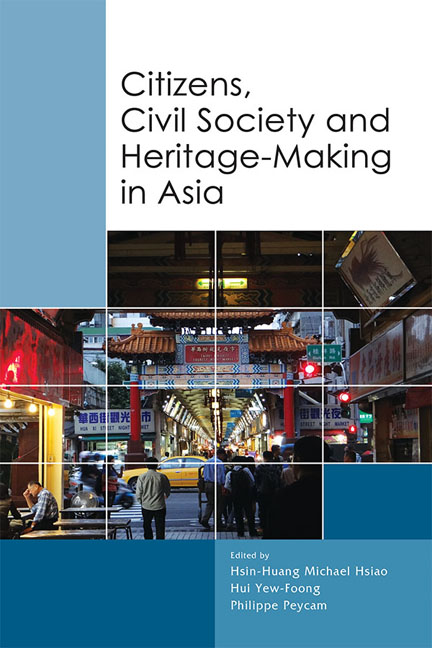Book contents
- Frontmatter
- Contents
- Contributors
- 1 Introduction: Finding the Grain of Heritage Politics
- 2 Heritage, Identity and Power
- 3 Heritage-Making and Post-coloniality in Yangon, Myanmar
- 4 Living Heritage of Ruins? Contesting the Paradox in Trowulan's Majapahit Heritage
- 5 The Reconstruction of Heritage in Rural Vietnam: An Analysis of State and Local Dynamics
- 6 Performing Cultures, Negotiating Identities: The Cultural Politics of Indigenous Cultural Villages in West Malaysia
- 7 Constituting Philippine Filmic and Linguistic Heritage: The Case of Filipino Regional Films
- 8 Encounter and Counter-Narratives of Heritage in Macau
- 9 Cultural Activities of the Chinese Community in Post-war Myanmar
- 10 Chinese Street Opera in Singapore: Heritage or a Vanishing Trade
- 11 Policy Formation and Civil Society Engagement in Heritage-Making in Taiwan: A Historical Examination
- 12 Becoming Taiwanese: Appropriation of Japanese Colonial Sites and Structures in Cultural Heritage-Making — A Case Study on the Wushantou Reservoir and Hatta Yoichi
- 13 Defining Culture in the Heritage Preservation of Taiwanese Veterans’ Villages: The Case of Zuoying
- 14 Tobacco Crop Memories in Taiwan: The Heritage of a Deadly Agriculture
- Index
1 - Introduction: Finding the Grain of Heritage Politics
Published online by Cambridge University Press: 03 January 2018
- Frontmatter
- Contents
- Contributors
- 1 Introduction: Finding the Grain of Heritage Politics
- 2 Heritage, Identity and Power
- 3 Heritage-Making and Post-coloniality in Yangon, Myanmar
- 4 Living Heritage of Ruins? Contesting the Paradox in Trowulan's Majapahit Heritage
- 5 The Reconstruction of Heritage in Rural Vietnam: An Analysis of State and Local Dynamics
- 6 Performing Cultures, Negotiating Identities: The Cultural Politics of Indigenous Cultural Villages in West Malaysia
- 7 Constituting Philippine Filmic and Linguistic Heritage: The Case of Filipino Regional Films
- 8 Encounter and Counter-Narratives of Heritage in Macau
- 9 Cultural Activities of the Chinese Community in Post-war Myanmar
- 10 Chinese Street Opera in Singapore: Heritage or a Vanishing Trade
- 11 Policy Formation and Civil Society Engagement in Heritage-Making in Taiwan: A Historical Examination
- 12 Becoming Taiwanese: Appropriation of Japanese Colonial Sites and Structures in Cultural Heritage-Making — A Case Study on the Wushantou Reservoir and Hatta Yoichi
- 13 Defining Culture in the Heritage Preservation of Taiwanese Veterans’ Villages: The Case of Zuoying
- 14 Tobacco Crop Memories in Taiwan: The Heritage of a Deadly Agriculture
- Index
Summary
This volume is a collection of papers from the second conference in a series of three. This series of three conferences was first envisioned to look into what we call “the cultural politics of heritage-making” in Asia. In positing the notion of “heritage-making”, we foreground “heritage” as a dynamic process, a product that is unfinished and always in the making, akin to Harvey's (2001) assertion that the term is a verb, that is, something that is done. We further recognize that this process of heritage-making is embedded in contesting political interests that seek to present “heritage” as a finished product, a noun that becomes appropriated as a form of cultural capital, broadly speaking. Or to put it another way, “heritage” becomes the manifest material and symbolic anchor for culture, and one must have a “heritage” as one must have a nose and two ears (to borrow Gellner's simile) if one is to be recognized and recognizable in the international, national and sub-national arenas. Thus, “heritage” implies the process of heritage-making, and this process, when we consider the politics of recognition that is at stake, is embedded in cultural politics of multiple scales (see Harvey 2014).
These multiple scales, ranging from the local to the national and international levels — which we do not assume are discrete arenas of social action — involve different players with different degrees of agency and interests. In a generic way these players include the state, local actors at the grass-roots level, and international organizations and experts. Again, we do not assume that these actors or the arenas that they operate in are discrete. Often we may find actors reprising roles across the different scales, which hints at the complex assemblages that produce what we call “heritage”. Without foregoing the multi-scalar complexities involved in the process of heritage-making, but with a view to foregrounding in turn the different sets of actors involved at different levels of the heritage-making chain, each of the conferences in the series focused on one set of players respectively. Thus, the first conference, held in Singapore in January 2014, focused on the role of the state.
- Type
- Chapter
- Information
- Citizens, Civil Society and Heritage-Making in Asia , pp. 1 - 14Publisher: ISEAS–Yusof Ishak InstitutePrint publication year: 2017

